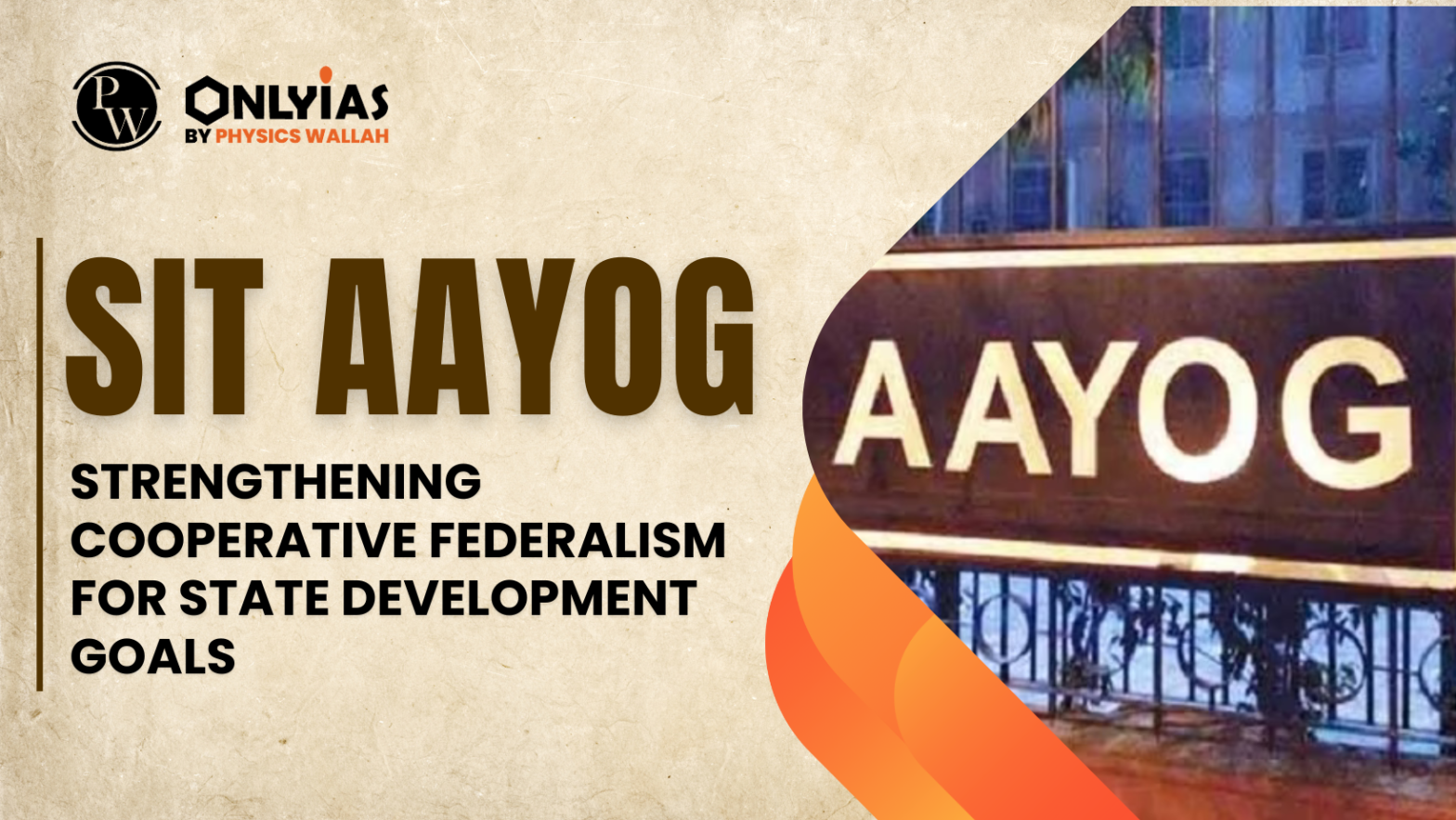Context:
- This article is based on an Editorial “NITI-like bodies to support states’ development goals”which was published in Mint. NITI Aayog has received requests from Rajasthan, Odisha, Chhattisgarh, Andhra Pradesh, etc. to set up the State Institute for Transformation (SIT) Aayog, a NITI-like body to prepare their development strategies & Strengthening Cooperative Federalism
| Relevancy for Prelims: NITI Aayog, State Institute for Transformation or SIT Aayog, Cooperative federalism, and State development goals.
Relevancy for Mains: State Institute for Transformation and Cooperative Federalism. |
SIT Aayog to Strengthen Cooperative Federalism
- Aim: Increasing the Gross State Domestic Product (GSDP), removing regional imbalances in development indicators and strengthening cooperative federalism.
- Objective: Attaining sustainable development goals (SDGs) by 2030 and India@2047 goals.
- Partner Institutions: Many reputed institutions of the State government and non-state government would be partner institutions.
- For example, SIT Karnataka has partner institutions like Karnataka Innovative Authority, Fiscal Policy Institute, etc.
Cooperative Federalism in Action: Empowering States through SIT Aayogs
- Holistic Policy Making and Evaluation: SITs will guide states in policy formulation, take up monitoring and evaluation of government policies, and suggest better technology or models for delivery of schemes.
- Focusing on Local Needs: While NITI Aayog promotes cooperative federalism in its policy making, it lacks in meeting diverse state needs, ground knowledge in local context, and there is limited customisation of policies according to local needs.
- Increase Efficiency: Managerial efficiency is extremely important for development outcomes and the core idea is that states can do a lot with existing resources.
- Ensuring National Development: Central government cannot ensure the development and sustainability of sectors under state government.
- Health, education, and infrastructure development are sectors for which state governments are responsible.
- Ease of Doing Business: SITs can play a crucial role in bringing various stakeholders, private sector, and experts in addressing important state specific issues.
- Training and Capacity Building: SITs can provide training and capacity building programs of professionals at all levels of government.
Also read: Federal Governance
Challenges Associated with SITs
- Reliance of Individual States: If states don’t take SITs seriously then their creation might not help the cooperative federalism.
- Resource Constraints: Setting up and maintaining a SIT requires financial resources, while many states face budgetary constraints, which can limit the scope and hindering the cooperative federalism framework.
- Data Availability and Quality: Ensuring access to accurate, timely, and relevant data can be challenging, particularly at the state level where data collection and management systems may be less developed.
Way Forward
- Boosting Cooperative Federalism: Empowering the role of states and local governments and making them partner in national development.
- Competitive Federalism: SITs are focused on innovation which can help the local economy by making it more competitive both domestically and internationally.
- Resource Mobilization: Ensuring sustainability in functioning of SITs by annual resource allocation. For example, Karnataka Government has allocated a sum of Rs 150 crore annually to SITK.
- Sustainable Development: Innovation can lead to more sustainable practices and solutions in areas like renewable energy, waste management, and resource conservation.
- Stakeholder Engagement: Need to ensure that the voice and needs of various stakeholders, including marginalized communities must be inclusive and participative.
Conclusion
The establishment of NITI Aayog like boday State Institutes for Transformation (SITs) or SIT Aayog at the state level is a significant step towards achieving goals of cooperative federalism and fulfilling the diverse development needs of Indian states. It can hold the potential to enhance policy customization, improve managerial efficiency, and foster innovation at the state level. However, their success will depend on states’ commitment, resource allocation, and robust data infrastructure. To realize the full potential of SITs, the Government must continue to strengthen its cooperative federalism approach, will prioritize sustainable development, and ensure inclusive stakeholder engagement for a more prosperous and equitable future.
| Attempt the Mains Question: The concept of cooperative federalism has been increasingly emphasized in recent years. Highlight the drawbacks in the existing structure and the extent to which cooperative federalism would answer the shortcomings. (GS Paper 2; UPSC Mains 2015). |
![]() 26 Sep 2023
26 Sep 2023
